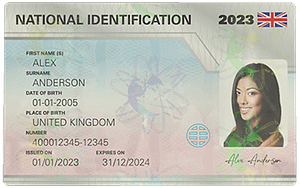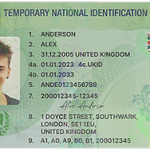Using fake ID cards is an illegal and often ethically – ambiguous practice, yet it occurs in various societies around the world. Understanding the psychology behind it can provide insights into human behavior and the factors that drive individuals to engage in such activities.
The Desire for Social Acceptance
One of the primary psychological reasons people use fake ID cards is the strong human need for social acceptance. In many social settings, such as bars, clubs, and certain parties, age – restricted environments create a sense of exclusivity. Young people, especially those who are just below the legal drinking or entry age, may feel left out when their peers are able to participate in these social events. They fear being seen as less “cool” or not part of the in – crowd. For example, in a college town, if most of a student’s friends are able to go to the local bars and have a good time on weekends, those who are underage may feel pressured to obtain a fake ID to fit in. This is a manifestation of the human desire to belong, which is a fundamental psychological need. According to Maslow’s hierarchy of needs, belongingness and love needs are important for an individual’s psychological well – being. When these needs are not met in a legitimate way, some may resort to illegal means like using a fake ID.

Rebellious Tendencies
Adolescence and young adulthood are periods often characterized by rebellious behavior. The legal age restrictions imposed on activities like drinking and entering certain venues can be seen as a form of authority. Some individuals, driven by a desire to challenge this authority, may use fake ID cards as a way to assert their independence. They view the age – based rules as arbitrary and a hindrance to their freedom. For instance, a 17 – year – old who has a strong sense of individualism may see the 21 – year – old drinking age as an unfair limitation on their right to enjoy alcohol like an adult. This rebellious mindset is fueled by the developmental stage of identity formation, where young people are trying to establish their own identities separate from their parents and societal norms. Using a fake ID becomes a symbol of their defiance against what they perceive as an over – restrictive system.
Curiosity and Exploration
Human beings are naturally curious creatures, and this curiosity can be a driving force behind the use of fake ID cards. The allure of activities that are off – limits due to age can be very strong. The idea of experiencing the adult world of bars, clubs, and other age – restricted places before reaching the legal age is appealing to many. Young people may be curious about the social interactions, the atmosphere, and the overall experience of these environments. They want to explore and satisfy their inquisitive minds. For example, a high – school senior who has heard stories about the nightlife in the city may be eager to see it for themselves. The restricted nature of these places only heightens their curiosity, and a fake ID seems like a means to gain access and quench their thirst for new experiences.
Escapism and Self – Expression
Some individuals use fake ID cards as a form of escapism. They may be going through difficult times in their lives, such as family problems, academic stress, or relationship issues. The world of age – restricted social activities can offer a temporary escape from their real – life problems. In these settings, they can reinvent themselves and present a different version of themselves. For instance, a college student who is struggling with a heavy course load and family expectations may use a fake ID to go to a club and pretend to be someone more carefree and confident. It becomes a way of self – expression as well, as they can dress and act in a way that is different from their usual daily self. This form of escapism provides a sense of relief and a chance to be in a different social context where they can forget about their troubles for a while.
Peer Influence
Peer influence is a powerful psychological factor in the use of fake ID cards. In a group of friends, if one or more individuals have fake IDs and are using them to access age – restricted places, others may be more likely to follow suit. Young people are highly influenced by their peers, especially during their formative years. They may not want to be seen as the “boring” or “lame” one who doesn’t participate in the activities that their friends are engaging in. For example, in a group of high – school friends who are all close to the legal age but not quite there yet, if one manages to get a fake ID and starts going to bars, the others may feel pressured to do the same. This is because they value their friendship and social standing within the group more than they value the legality of the situation.
Common Problems and Solutions
- Legal Consequences: One of the most obvious problems is the legal trouble that comes with using a fake ID. Depending on the jurisdiction, it can result in fines, community service, or even jail time. Solution: Education is key. Schools, parents, and community organizations should conduct awareness programs about the serious legal implications of using fake IDs. They should also provide alternative social activities for young people that do not involve breaking the law, such as organized parties or events that are age – appropriate.
- Identity Theft Risks: When obtaining a fake ID, individuals may be at risk of identity theft. The process of getting a fake ID often involves sharing personal information with potentially untrustworthy sources. Solution: Young people should be educated about the risks of identity theft and the importance of protecting their personal information. They should be made aware that any form of illegal activity, including getting a fake ID, can expose them to these risks. Additionally, law enforcement should crack down on the illegal production and distribution of fake IDs to reduce the availability of such services.
- Negative Social Impact: Using fake IDs can lead to negative social impacts within a community. It can contribute to underage drinking, which is associated with various problems such as alcohol – related accidents, academic problems, and health issues. Solution: Communities should implement stricter enforcement of age – restricted laws in bars, clubs, and other venues. There should also be more support for young people in terms of providing positive social and recreational opportunities that do not involve illegal or harmful behavior. For example, community centers can offer more youth – oriented activities like sports leagues, art classes, and cultural events.
- Damage to Reputation: If an individual is caught using a fake ID, it can damage their reputation, especially in academic or professional settings. It may also affect their future opportunities, such as college admissions or job applications. Solution: Young people should be encouraged to think about the long – term consequences of their actions. Schools and parents can provide counseling and guidance to help them make better decisions. They should also be made aware of the importance of building a positive reputation from a young age and how illegal activities can have a lasting negative impact on it.
- Psychological Distress: The stress of using a fake ID, including the fear of being caught and the guilt associated with breaking the law, can cause psychological distress. Solution: Mental health services should be more accessible to young people. Schools can offer counseling services specifically focused on helping students deal with peer pressure, stress, and the psychological impact of making wrong decisions. Additionally, parents should be more involved in their children’s lives, providing emotional support and open communication channels so that young people feel comfortable discussing their problems and concerns instead of resorting to illegal behavior.


